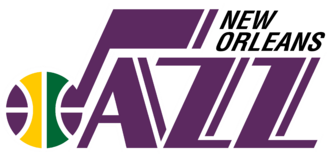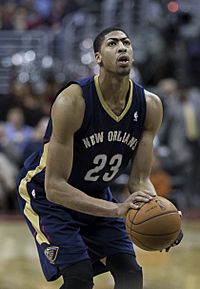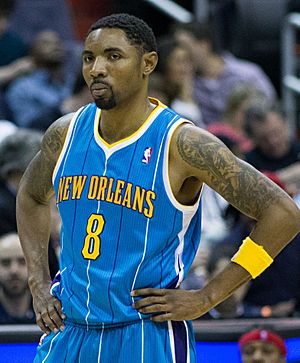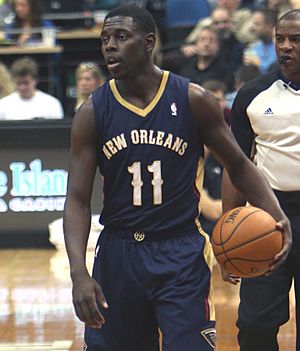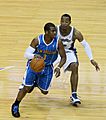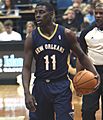New Orleans Pelicans facts for kids
Quick facts for kids New Orleans Pelicans |
|||
|---|---|---|---|
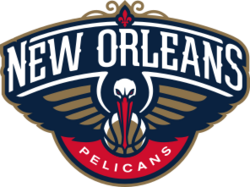 |
|||
| Conference | Western | ||
| Division | Southwest | ||
| Founded | 2002 | ||
| History | New Orleans Hornets 2002–2005, 2007–2013 New Orleans/Oklahoma City Hornets 2005–2007 New Orleans Pelicans 2013–present |
||
| Arena | Smoothie King Center | ||
| Location | New Orleans, Louisiana | ||
| Team colors | Navy blue, gold, red |
||
| Main sponsor | NewAge Products | ||
| President | Dennis Lauscha | ||
| Vice-president(s) | Joe Dumars | ||
| General manager | Bryson Graham | ||
| Head coach | Willie Green | ||
| Ownership | Gayle Benson | ||
| Affiliation(s) | Birmingham Squadron | ||
| Championships | 0 | ||
| Conference titles | 0 | ||
| Division titles | 1 (2008) | ||
| Retired numbers | 1 (7) | ||
|
|||
The New Orleans Pelicans are a professional basketball team from New Orleans, USA. They play in the National Basketball Association (NBA). The team is part of the Southwest Division in the Western Conference. Their home games are played at the Smoothie King Center.
The team started as the New Orleans Hornets in the 2002–03 season. Their owner, George Shinn, moved the team from Charlotte to New Orleans. In 2005, Hurricane Katrina caused a lot of damage. The team then moved temporarily to Oklahoma City for two seasons. During this time, they were called the New Orleans/Oklahoma City Hornets. They returned to New Orleans for the 2007–08 season. In 2013, the team changed its name to the New Orleans Pelicans.
Since moving from Charlotte, the New Orleans team has played 22 seasons. They have won 831 games and lost 937. The team has made it to the playoffs nine times. They have won two playoff series and one division title. The Pelicans have not yet reached the conference finals. They are one of only two teams never to play in that round.
Contents
- Team History
- Team Logos and Uniforms
- Team Personnel
- Team Records
- Season-by-Season Performance
- Head Coaches
- Home Arenas
- Team Mascot
- Images for kids
- See also
Team History
Basketball in New Orleans Before the Pelicans
New Orleans had a basketball team called the New Orleans Buccaneers from 1967 to 1970. They were part of the ABA league. But the team moved because they didn't have a good arena and didn't win much. In 1974, New Orleans got an NBA team called the New Orleans Jazz. This name was a tribute to the city's famous jazz music.
The Jazz team also faced problems with money and finding a good place to play. They moved to Salt Lake City in 1979. One famous player for the Jazz in New Orleans was "Pistol" Pete Maravich. He was a very exciting player and led the league in scoring in the 1976–77 season. Even with him, the Jazz's best record in New Orleans was 39 wins and 43 losses.
In 1994, the Minnesota Timberwolves almost moved to New Orleans. They would have played in the Louisiana Superdome. But the NBA stopped the move because of money problems. New Orleans also tried to get the Vancouver Grizzlies team. Finally, in 2002, New Orleans got a new NBA team.
2002–2005: Moving to New Orleans
The Charlotte Hornets were a good team in the 1990s. But fewer fans came to their games. Many people thought this was because of the team's owner, George Shinn. He was not popular in Charlotte. Shinn also wanted a new arena with more luxury seats.
In 2001, Shinn said the Hornets would leave Charlotte if the city didn't build a new arena for free. The city first said no. Shinn then looked at other cities like Norfolk, Louisville, and St. Louis. St. Louis already had an NBA-ready arena.
Charlotte leaders later offered a plan for a new arena. But they said they would only build it if Shinn sold the team. The NBA thought this was unfair to Shinn. So, the Hornets asked to move to New Orleans. The NBA approved the move. As part of the deal, the NBA promised Charlotte would get a new team later. This team became the Charlotte Bobcats in 2004.
The Hornets played their first game in New Orleans on October 30, 2002. They played against the Utah Jazz, the team that used to be in New Orleans. The Hornets won 100–75. At halftime, they honored "Pistol" Pete Maravich by retiring his number 7 jersey. The Hornets finished their first season with 47 wins and 35 losses. They lost in the first round of the 2003 playoffs.
After that season, the team changed coaches. They started the 2003–04 season well but finished with 41 wins and 41 losses. They lost in the first round of the 2004 playoffs. The team then hired Byron Scott as their new coach.
For the 2004–05 season, the Hornets moved to the Western Conference. This was to balance the number of teams in each conference. That season, many players got hurt. The team finished with only 18 wins and 64 losses, their worst record ever.
2005–2011: The Chris Paul Years
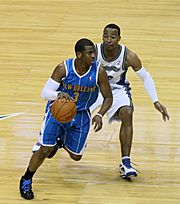
In the 2005 draft, the Hornets picked Chris Paul. He was a great point guard from Wake Forest University. In 2005, Hurricane Katrina hit New Orleans very hard. Because of this, the Hornets moved their operations to Oklahoma City, Oklahoma. They played there for two seasons (2005–06 and 2006–07). During this time, they were called the New Orleans/Oklahoma City Hornets. Most home games were in Oklahoma City, but some were still in New Orleans.
The Hornets returned to New Orleans full-time for the 2007–08 season. All their home games were played in the New Orleans Arena. The 2008 NBA All-Star Game was also held in New Orleans. The team had a very successful season, winning 56 games and losing 26. This was their best record ever. They also won their first division title, the Southwest Division.
In the 2008 playoffs, the Hornets beat the Dallas Mavericks in the first round. But they lost to the San Antonio Spurs in seven games in the next round.
In 2008, the Hornets changed their logo and uniforms. They used colors like Creole blue, purple, and Mardi Gras gold. They also added pinstripes to the uniforms. The team finished the 2008–09 season with 49 wins and 33 losses. They lost in the first round of the 2009 playoffs to the Denver Nuggets.
The Hornets started the 2009–10 season with a poor record. They fired their coach, Byron Scott. The team finished the season with 37 wins and 45 losses. Monty Williams became the new head coach. The team finished the 2010–11 season with 46 wins and 36 losses. They made the 2011 NBA playoffs but lost to the Lakers. In December 2010, the NBA bought the Hornets team from George Shinn.
Chris Paul Leaves the Team
Before the 2011–12 season, Chris Paul wanted to be traded. He wanted to go to the New York Knicks or Los Angeles Lakers. The NBA, which owned the team at the time, stopped a trade that would have sent him to the Lakers. On December 14, 2011, the Hornets traded Chris Paul to the Los Angeles Clippers. In return, they received players like Eric Gordon and Al-Farouq Aminu.
2012–2019: The Anthony Davis Years
Starting the Anthony Davis Era
On April 13, 2012, Tom Benson, who owned the New Orleans Saints football team, bought the Hornets. He paid $338 million for the team. Benson said he wanted to change the team's name to something that fit New Orleans better. This led to rumors that the "Hornets" name might go back to Charlotte.
On May 30, 2012, the Hornets won the first pick in the 2012 NBA draft. They used this pick to draft Anthony Davis. Some people thought the draft lottery was fixed because a picture of Davis in a Hornets hat appeared early. The team also drafted Austin Rivers with the tenth pick.
From Hornets to Pelicans
Tom Benson wanted to change the team's name to something more local. He even hoped the Utah Jazz would give up their name, since they started in New Orleans. But the Jazz didn't want to.
On December 4, 2012, it was announced that the Hornets would change their name to the New Orleans Pelicans. This change started with the 2013–14 season. The name "Pelicans" comes from the brown pelican, which is Louisiana's state bird. The name "Pelicans" was also used by a minor-league baseball team in New Orleans from 1901 to 1957.
The team officially announced the name change on January 24, 2013. They showed off new logos and colors: navy blue, gold, and red. These colors are also on the flag of New Orleans. On April 18, 2013, the team officially became the New Orleans Pelicans.
After New Orleans stopped using the "Hornets" name, the Charlotte Bobcats decided to change their name back to the Charlotte Hornets. This happened for the 2014–15 season. The NBA approved this change. The Pelicans also agreed to give the Charlotte team all the records and history from the original Hornets (1988–2002). This meant the Pelicans were now seen as a new team that started in 2002.
On June 27, 2013, the Pelicans traded their draft pick, Nerlens Noel, for All-Star point guard Jrue Holiday from the Philadelphia 76ers.
Return to the Playoffs
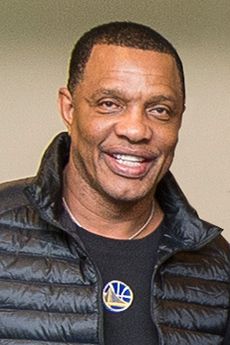
In the 2014–15 season, the Pelicans made the NBA playoffs for the first time under their new name. They had 45 wins and 37 losses. They faced the Golden State Warriors in the first round and lost in four games. After the season, the Pelicans fired coach Monty Williams.
On May 31, 2015, the Pelicans hired Alvin Gentry as their new head coach. The Pelicans did not make the 2016 NBA playoffs, finishing with 30 wins and 52 losses. They drafted Buddy Hield with the 6th pick in the 2016 NBA draft.
End of the Anthony Davis Era
On February 20, 2017, the Pelicans traded for DeMarcus Cousins from the Sacramento Kings. They gave up Buddy Hield and other players for him. On February 1, 2018, the Pelicans also traded for Nikola Mirotić from the Chicago Bulls.
On March 15, 2018, owner Tom Benson passed away. His wife, Gayle Benson, became the owner of the Pelicans and Saints.
The Pelicans made the playoffs again on April 9, 2018. They finished with 48 wins and 34 losses. In the first round, they swept the Portland Trail Blazers in four games. They then lost to the Golden State Warriors in five games.
In January 2019, Anthony Davis asked to be traded from the team. On May 14, 2019, the Pelicans won the first overall pick in the 2019 NBA draft lottery. On June 15, 2019, the Pelicans agreed to trade Davis to the Los Angeles Lakers. In return, they received players like Lonzo Ball, Brandon Ingram, and Josh Hart, plus three first-round draft picks. This trade was completed on July 6, 2019, ending the Anthony Davis era for the Pelicans.
2019–Present: The Zion Williamson Era
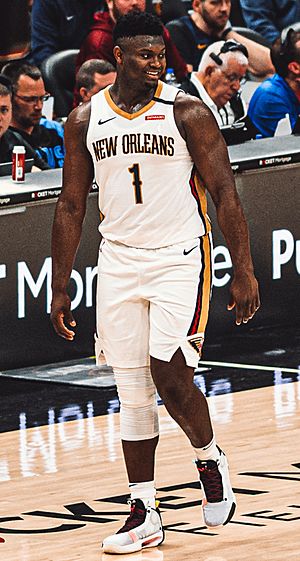
On April 17, 2019, David Griffin became the new executive vice president of basketball operations. On May 19, 2019, Trajan Langdon became the new general manager.
On June 20, 2019, the Pelicans picked Zion Williamson as the first overall player in the draft. The team signed Williamson to his first contract on July 1. However, Williamson missed the start of the 2019–20 season due to knee surgery. He played his first game on January 22, 2020. On March 3, 2020, Williamson was named the NBA Rookie of the Month for February.
Brandon Ingram had a great season. He was named the Western Conference Player of the Week in December 2019. On January 16, 2020, Ingram scored a career-high 49 points in a game against the Utah Jazz. Because of his strong performance, Ingram became an NBA All-Star for the first time. He also won the 2020 Most Improved Player award.
The NBA season was paused in 2020. The Pelicans were one of 22 teams invited to the NBA Bubble to finish the season. On August 9, 2020, the Pelicans were eliminated from playoff contention.
In a trade with the Portland Trail Blazers, the Pelicans got CJ McCollum, Larry Nance Jr., and Tony Snell. Even though Zion Williamson missed the entire 2021–22 NBA season due to injury, the Pelicans finished with 36 wins and 46 losses. This earned them a spot in the play-in tournament. On April 13, 2022, the Pelicans won their first play-in game. Two days later, they won their second play-in game. This meant they made the playoffs for the first time since 2018.
The Pelicans drafted Dyson Daniels with the 8th pick in the 2022 draft. Zion Williamson was chosen for his second All-Star game, even though he only played 29 games. Other Pelicans players also dealt with injuries. The team made the play-in tournament for the second year in a row but did not advance to the playoffs.
For the 2023–24 season, Zion Williamson stayed healthy for most of the regular season, playing 70 games. Herb Jones, a player drafted in 2022, made the All-Defensive First Team. The Pelicans finished with 49 wins and 33 losses. They made the play-in tournament for the third year in a row. Zion Williamson scored 40 points in a loss to the Lakers, but he got injured in that game, ending his season. Even without Williamson, the Pelicans beat the Kings. They advanced to the playoffs but were swept by the Oklahoma City Thunder.
2024–Present: New Players and Changes
In the 2024 off-season, the Pelicans traded for Dejounte Murray, an All-Star player. They sent Dyson Daniels, Larry Nance Jr., and other players to the Atlanta Hawks.
On February 6, 2025, Brandon Ingram was traded to the Toronto Raptors. The Pelicans received Bruce Brown, Kelly Olynyk, and future draft picks. In October 2025, the Pelicans are scheduled to play two preseason games in Melbourne, Australia.
Team Logos and Uniforms
The New Orleans Hornets first wore teal and white uniforms. They also used purple and gold as accent colors. In 2004, they added a gold uniform. By 2006, the gold uniform became their main road uniform. The teal uniform was used as an alternate. All three uniforms had the city name on the front.
When the Hornets played in Oklahoma City (2005–2007), they wore white uniforms with the team name. They had a special patch with "OKC" on it. They also had a white uniform with "Oklahoma City" on it. A red uniform was worn on Valentine's Day 2007. These red uniforms were sold for charity. Both the white and red uniforms later had a "NOLA" patch instead of "OKC".
In 2008, the Hornets got new logos and uniforms. The letters and numbers looked like the wrought iron designs in New Orleans. Teal was changed to "creole blue," and pinstripes were added. The next season, the Hornets wore special uniforms during Mardi Gras week. These had purple fronts, green backs, and "NOLA" in gold. Before the 2010–11 season, a gold alternate uniform returned. It had pinstripes and "NOLA" on the front.
When Tom Benson bought the team in 2012, he wanted to change the name. On December 14, 2012, it was reported the team would become the New Orleans Pelicans. On January 24, 2013, the team showed its new name, logos, and colors. The name "Pelicans" refers to the brown pelican, Louisiana's state bird. The team's colors are navy, gold, and red, which are also on the city flag of New Orleans. The team officially became the Pelicans at the end of the 2012–13 season.
On August 1, 2013, the Pelicans showed their new uniforms. The "New Orleans" name on the jerseys looks like French Quarter street signs. The Pelicans are one of the few NBA teams to have their city name on both home and away jerseys. A special "Bird-de-Lis" logo is on the back of the neck.
On September 23, 2014, the Pelicans showed a red alternate uniform. This was for the 2014–15 season. The NBA logo was moved to the back of all team jerseys.
On September 17, 2015, the Pelicans showed a new alternate uniform. These short-sleeved uniforms had Mardi Gras colors: purple, green, and gold. They had "NOLA" (a short name for New Orleans, Louisiana) across the chest.
In 2017, the Pelicans' uniforms were slightly changed when Nike became the uniform supplier. The white and navy uniforms had a larger "New Orleans" wordmark. They also continued to wear Mardi Gras-themed uniforms. For the 2018–19 season, they wore an "Earned" uniform because they made the playoffs.
For the 2020–21 season, the Pelicans' "City" uniform was inspired by the New Orleans city flag. The 2021–22 "City" uniform was white and had "NOLA" lettering shaped like a bird. The Pelicans' 2022–23 "City" uniform brought back the Mardi Gras design with a dark purple color.
Before the 2023–24 season, the red "Statement" uniform was updated. It now says "Crescent City" in white letters. Their "City" uniform for that season was black with neon green letters. This was inspired by New Orleans' lively nightlife. The "City" uniform for the 2024–25 season mixed the previous season's look with the Mardi Gras style. It was dark purple with "NOLA" in gold and neon green.
Team Personnel
Current Roster
Retained Draft Rights
The Pelicans hold the rights to players they drafted who are playing outside the NBA. This means if these players decide to play in the NBA, they must sign with the Pelicans.
| Draft | Round | Pick | Player | Pos. | Nationality | Current team | Note(s) | Ref |
|---|---|---|---|---|---|---|---|---|
| 2010 | 2 | 48 | Latavious Williams | F | Al-Ittihad Jeddah (Saudi Arabia) | Acquired from Miami Heat (via Oklahoma City) |
Retired Numbers
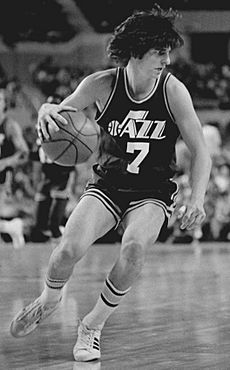
When a team retires a player's number, it means no other player on that team will wear that number again. It's a way to honor important players.
| New Orleans Pelicans Retired Numbers | ||||
| No. | Player | Position | Years Played | Retired |
|---|---|---|---|---|
| 7 | Pete Maravich | G | 1974–1979 1 | October 30, 2002 |
Notes:
- 1 The New Orleans Hornets retired Maravich's number during their first game in New Orleans. This honored his basketball contributions to Louisiana. He played college basketball at Louisiana State University (LSU) and professionally for the city's former NBA team, the New Orleans Jazz.
- The NBA retired Bill Russell's No. 6 for all its teams on August 11, 2022. No NBA team can use this number anymore.
Team Records
Season-by-Season Performance
This table shows the Pelicans' performance over the last five seasons. Note: GP = Games played, W = Wins, L = Losses, W–L% = Winning percentage
| Season | GP | W | L | W–L% | Finish | Playoffs |
| 2020–21 | 72 | 31 | 41 | .431 | 4th, Southwest | Did not qualify |
| 2021–22 | 82 | 36 | 46 | .439 | 3rd, Southwest | Lost in first round, 2–4 (Suns) |
| 2022–23 | 82 | 42 | 40 | .512 | 2nd, Southwest | Did not qualify |
| 2023–24 | 82 | 49 | 33 | .598 | 2nd, Southwest | Lost in first round, 0–4 (Thunder) |
| 2024–25 | 82 | 21 | 61 | .256 | 5th, Southwest | Did not qualify |
Head Coaches
This table lists all the head coaches for the New Orleans Pelicans.
| Name | Tenure | Totals | Regular season | Playoffs | |||||||||
|---|---|---|---|---|---|---|---|---|---|---|---|---|---|
| G | W | L | PCT | G | W | L | PCT | G | W | L | PCT | ||
| Paul Silas | 2002–2003 | 88 | 49 | 39 | .557 | 82 | 47 | 35 | .573 | 6 | 2 | 4 | .333 |
| Tim Floyd | 2003–2004 | 89 | 44 | 45 | .494 | 82 | 41 | 41 | .500 | 7 | 3 | 4 | .429 |
| Byron Scott | 2004–2009 | 436 | 211 | 225 | .484 | 419 | 203 | 216 | .484 | 17 | 8 | 9 | .471 |
| Jeff Bower | 2009–2010 | 73 | 34 | 39 | .466 | 73 | 34 | 39 | .466 | 0 | 0 | 0 | – |
| Monty Williams | 2010–2015 | 404 | 175 | 229 | .433 | 394 | 173 | 221 | .439 | 10 | 2 | 8 | .200 |
| Alvin Gentry | 2015–2020 | 337 | 150 | 187 | .445 | 328 | 145 | 183 | .442 | 9 | 5 | 4 | .556 |
| Stan Van Gundy | 2020–2021 | 72 | 31 | 41 | .431 | 72 | 31 | 41 | .431 | 0 | 0 | 0 | – |
| Willie Green | 2021–present | 338 | 150 | 188 | .444 | 328 | 148 | 180 | .451 | 10 | 2 | 8 | .200 |
Home Arenas
The Pelicans play their home games at these arenas:
- Smoothie King Center (2002–present): This arena was known as New Orleans Arena from 2002 to 2014.
- Ford Center (2005–2007): This was a temporary home in Oklahoma City due to Hurricane Katrina.
Team Mascot
Pierre the Pelican is the official mascot for the New Orleans Pelicans. He was first introduced on October 30, 2013. This was the opening night of the regular season for the team at home. Fans chose his name through an online poll. Pierre's original design looked a bit scary to some fans. So, his head was redesigned on February 11, 2014. The Pelicans' mascot before Pierre was Hugo the Hornet. Hugo was with the team from 2002 to 2013. Hugo returned as the mascot for the Charlotte Hornets starting in the 2014–15 season.
Images for kids
-
Chris Paul was chosen by the Hornets in the 2005 NBA draft.
-
Alvin Gentry was the team's coach from 2015 to 2020.
-
Zion Williamson is a key player for the Pelicans.
-
"Pistol Pete" Maravich's number 7 jersey was retired.
See also
 In Spanish: New Orleans Pelicans para niños
In Spanish: New Orleans Pelicans para niños
 | Claudette Colvin |
 | Myrlie Evers-Williams |
 | Alberta Odell Jones |


